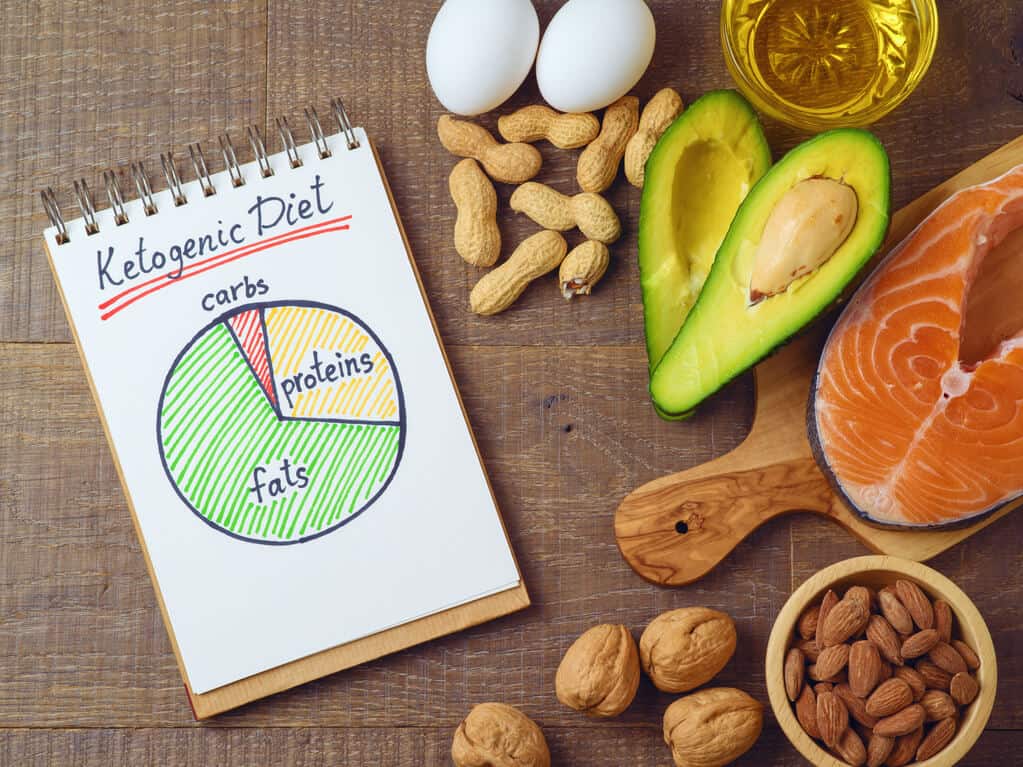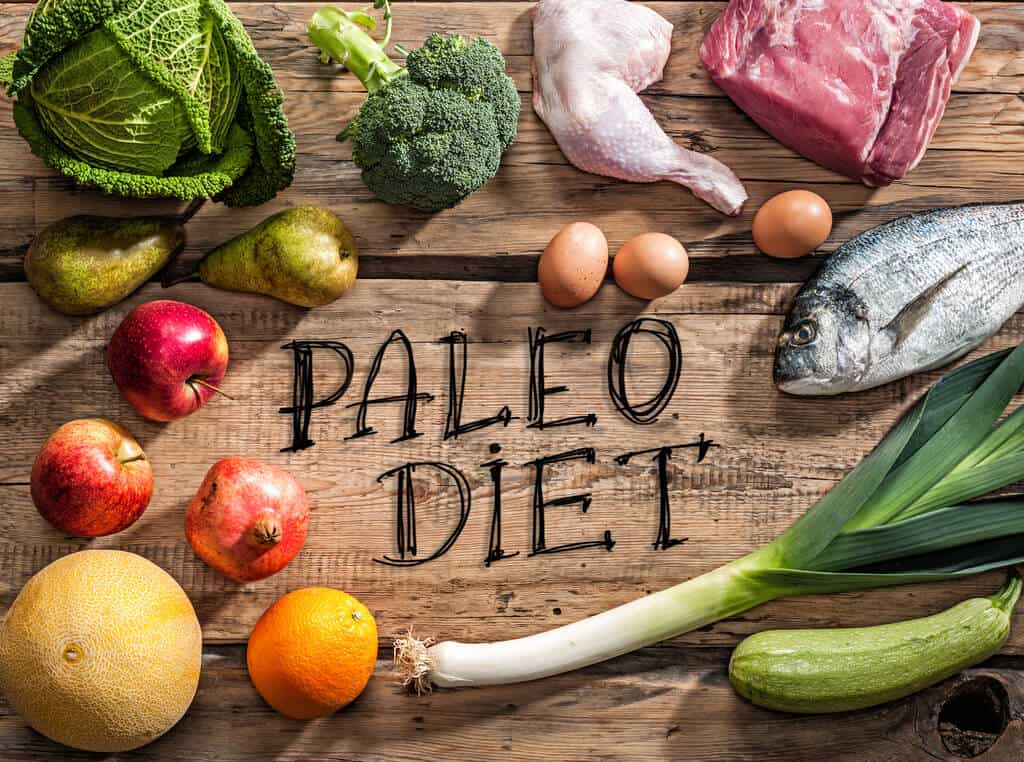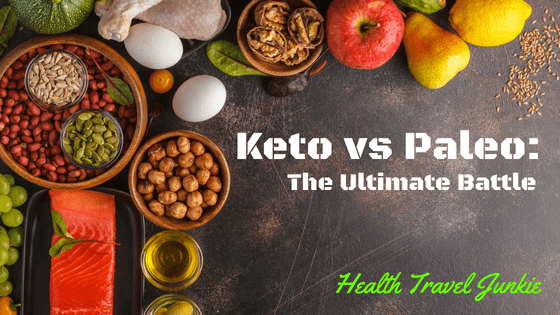Keto or Paleo? Both diets are extremely popular while many celebs and fitness experts swear by them. If you’re just an average person trying to get in shape and lose weight, it can be really hard to decide which diet to follow. You don’t know what to believe and it feels almost impossible to pick a side. Both diets have their unique benefits and flaws. Hopefully, after reading this post you’ll be able to make your final decision.
Contents
Keto Diet

Keto diet was originally used in the 1920s to help patients with epilepsy. Scientists noticed that as a dietary side-effect, many patients lost weight. Today, keto diet is followed by those who want to slim down and burn fat quickly.
When you severely restrict or completely eliminate carbs from your diet, your body can’t use glucose as an energy source. Thus it switches from using glucose as fuel towards using fat instead, while producing ketones as a byproduct. This puts your body into a state of ketosis, and now it burns stored fat.
Keto diet is based primarily on healthy fats, it’s also known as a high-fat / low-carb diet. Your nutrition plan should be divided into more or less: 75% fats, 20% proteins and only 5% carbs.
Typical Keto Foods
Typical Keto Diet approved foods include (a) eggs, (b) high-fat milk products e.g. cheese, butter and sugar-free yoghurt, (c) avocados, olives, and berries, (d) meat and fish, (e) healthy oils e.g. coconut and extra virgin olive oil, (f) green leafy vegetables, and (g) nuts and seeds.
Keto Health Benefits
- Good for certain medical conditions (Alzheimer’s, type 2 diabetes, epilepsy)
- Rapid weight loss
- Improved insulin sensitivity
- It is also argued to improve energy levels and mental clarity
Several scientific studies have found that keto diet could be used along with prescribed meds to treat certain diseases (1). It’s particularly effective when it comes to Parkinson’s disease, Alzheimer’s and epilepsy. A meta-analysis conducted by scientists from Harvard showed that high-fat/low-carb diet is better for weight loss compared to low-fat diet only (2).
Since you eat almost no carbs, your blood glucose level drops and your insulin sensitivity improves. This could be very beneficial for those with insulin resistance. If you’re suffering from type 2 diabetes or insulin resistance then keto might be perfect for you!
Keto Negatives
- It takes around two weeks to adapt
- Too restrictive
- Dining out becomes a nightmare
- Not for long-term use
It takes time to reach ketosis. It can take you anywhere from one to two weeks and during this time your metabolism goes through radical changes. This can leave you with brain fog, fatigue and weakness. These symptoms are known as “keto flu“. Once your body adapts to these changes, you’ll feel much better.
If you really love carbs then Keto isn’t the right choice for you. It’s very restrictive and it takes a lot of determination and willpower to stick to it.
Social gatherings can become a nightmare when you’re on keto. Your kid’s birthday? Sorry, no cake for you. Dining out with your friends? You can’t have fries with your burger, and you should eat it without the bun. If you’re not ready for this kind of commitment, you better opt for a different and less restrictive diet.
If you’re on keto for a long time, you might end with some vitamin deficiency. Since you don’t eat a lot of fruits, your body can lack some very important minerals. Consider this before going keto and remember to take supplements if you have a mineral deficiency.
Paleo Diet

Paleo diet, also known as the caveman diet, focuses on eating whole, unprocessed foods. Basically, you’re supposed to imitate the eating habits of your cavemen ancestors. The reasoning behind this is that the current western diet has led to a disease-ridden society with a widespread obesity epidemic. On the other hand, researchers who studied our distant ancestors noted they were in much better shape both physically and healthwise.
When you follow paleo you can’t eat legumes, starchy vegetables, grains, salty foods, processed sugar and dairy products. However, you can eat meat, animal products (like eggs and honey), vegetables, fruits, seeds and nuts.
Paleo Health Benefits
- Clean Eating (with no Additives, Preservatives or artificial sweeteners like Aspartame)
- Weight Loss
- Consuming Healthy Unsaturated Oils e.g. Olive-, Coconut-, and Walnut Oil
- Substituting with Healthier Alternatives e.g. grass-fed meat instead of grain-fed beef
Paleo is great when it comes to eliminating junk food. If you go paleo you’ll eat much healthier and you’ll make smarter food choices. Of course, when you cut out refined sugar and salty snacks, you’ll lose weight quickly, which is another benefit.
Consuming healthy unsaturated oils is much better compared to saturated fats, which can lead to cardiovascular problems caused by high levels of bad cholesterol. Paleo diet is a great way to avoid this, and it’s a heart-healthy diet.
Paleo Negatives
- Lacks variety
- No wholegrains (possible lack of fibers)
- No dairy
Paleo can get boring because you don’t get to eat some really tasty foods. It can be tricky to create a meal plan because your options are very limited. Another big problem is the absence of grains in the diet. Whole grains such as rice, barley, oats and quinoa have many health benefits. They are full of nutrients and a great source of fiber, which is important for optimal gut health and overall wellbeing.
Dairy is prohibited on the Paleo diet. Although this may be a negative for some, over-consuming dairy products can cause obesity, higher cholesterol, allergies, and potentially even osteoporosis (3).
Keto Vs Paleo: The Bottom Line
As you can see, both diets have many health benefits. They’ll help you lose weight and make healthier food choices. However, each person is different, and not everyone has the same goals. The best diet for you is the one which you can follow easily.
If you really love carbs and you can’t go without them, choose Paleo. If you love dairy and you can’t imagine your day without a nice glass of milk, choose Keto. It all depends on your personal preferences and fitness goals. If you’re a highly active person, then you may find that low carb diets make you feel tired and weak. If these diets are too restrictive and radical for you, you can start with modified versions by gradually restricting, for example, the grains in the Paleo diet.
In the end, the only thing that matters is your physical and mental wellbeing. Whichever diet you choose, stay on track and don’t give up. It’s not going to be easy, but it will be worth it. A happier, healthier version of you awaits around the corner.
Buy one of the cookbooks below on Amazon to help you get started in your chosen diet.
Paleo Recipes
Check out the Paleo For Beginners Recipe book (click on book below to check the price).
Ketogenic Recipes
Find out why “Wicked Good Ketogenic Diet Cookbook” receives so many 5 star reviews (click on book photo to get price at Amazon).
Keto vs Paleo: Which one is your choice? Post your own experience or questions in the comment section below!




One thing that keeps me from going Paleo is that it is still higher in saturated fat relative to many other diet options. Cavemen would not have had any bread or cookies available to eat but they would have been eating plenty of animal meat which means a lot more saturated fat. Of course you could try to substitute some of that saturated fat for monounsaturated and polyunsaturated fats, but then is it really still Paleo? Our cavemen ancestors surely would not have been tearing off the animal fat and replacing it with avocados, right? Which brings me to my question. Can something that our bodies adapted to eat a lot of really be bad for us? A quick Google search for “is saturated fat bad” brings up many articles claiming that saturated fat is not actually that bad and others saying that it is. I would love if you could write an article which delves deeper into the saturated fat controversy.
Hi Marco. Thanks for the Comment. Yes not having bread or cookies around to eat is a good thing (unless it’s 100% wholewheat bread). But then again the saturated fat isn’t that good either. However, there are a lot of conflicting research. Thus I think it is a good idea to delve further into the saturated fat controversy. Thanks for suggesting that post topic.
I do think meat was leaner in the paleo days. For example, I don’t know if you ever ate wild game meat like Kudu, Eland, Wildebeest, Ostrich, etc. There is almost zero fat on the meat. But modern meats like beef from cows or lamb meat, are deliberately bred in such a way that their meat is bulky and full of fats, to maximize profits. These are not the same animals that use to roam the earth in the paleolithic age. I’d recommend seeking out lean meats, free-range meats, where the animals are not fed tons of soya grains. You’ll get a better quality meat. Similarly with e.g. picking wild caught salmon instead of factory farmed. It is proven that wild-caught is a better quality meat and this is what our ancestors ate. Not the fatty factory farmed meat we are provided with nowadays. So although your body may have adapted to be able to digest chicken farmed in a small one-foot cubicle, doesn’t mean its good for you.